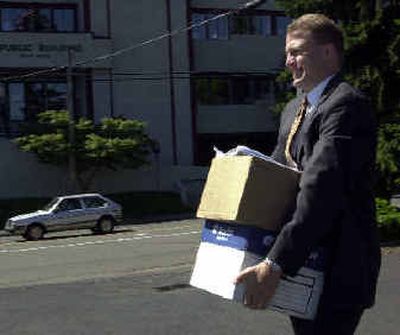Gambling petitions turned in

OLYMPIA – Initiative promoter Tim Eyman on Monday hauled a dozen boxes of petitions into the secretary of state’s office, launching what is likely to be a months-long fight over how much gambling Washington wants.
“It’s going to be a hot one, and it’s going to keep getting hotter,” said Joe Pakootas, chairman of the business council of the Confederated Tribes of the Colville Reservation.
Eyman’s measure, Initiative 892, would allow more than 18,000 additional slot-style machines at bars, bowling alleys, bingo halls and restaurants throughout the state. The signature-gathering – and Eyman’s $3,100-a-week salary – were bankrolled largely by the businesses that would get the machines.
Eyman on Monday turned in 238,000 signatures, about 20 percent more than the 197,734 needed. But due to fears over illegible handwriting or unregistered voters wrongly signing the petitions, Eyman said he wants to have a cushion of 260,000 signatures. He said he’ll return Friday with more signatures. He wouldn’t comment, however, on whether his other property tax measure, I-864, will garner enough signatures. That measure would lower local property taxes.
As things stand now, the only people with the slot-style machines are Washington’s Indian tribes, which run 15,435 of them at two dozen facilities, mostly casinos. The tribes say the popular, lucrative machines are simply a faster version of a state lottery, and that the proceeds help pay for tribal government, health, education and social service projects.
Eyman and nontribal businesses say the tribes have an unfair monopoly that nontribal businesses can’t hope to compete with. He’s labeled his measure the “Just Treat Us the Same” initiative.
“I have no doubt that the tribes are going to spend millions of dollars trying to protect their government-protected monopoly,” he said.
Eyman is a Mukilteo watch salesman who found fame leading recent anti-tax ballot measures, including I-695, which reduced car license tabs to $30 a year. Hoping to tap into anti-tax sentiment again, Eyman says that the new initiative would cut people’s property taxes by $400 million a year, replacing that money with a 35 percent tax on the new gambling machines.
At a press conference in Olympia on Monday, Eyman said Washington is the seventh-highest-taxed state in America, according to the Washington, D.C.-based Tax Foundation. (Idaho, the group says, is 35th.)
“I-892 keeps us from hitting No. 1,” Eyman said. Property tax hikes over the past two decades, he said, have been “obscene and unsustainable. Property taxes will continue to skyrocket unless voters say, ‘Enough.’ “
Washingtonians are apparently averse to expanding gambling here. Despite intense pressure from cardrooms, bowling alleys, taverns and charity gambling programs, state lawmakers and regulators have repeatedly balked in recent years at allowing more machines or even raising the betting limit for the small minority of high-stakes gamblers.
“Does Washington state want to be Las Vegas?” said Ron Allen, president of the Washington Indian Gaming Association.
“If bowling alleys have it, does that mean Burger King’s going to be next?” said Curt Holmes, vice chairman of the Kalispel Tribe.
Independent pollster Stuart Elway said that a poll he did in March 2003 showed that Washingtonians were slightly opposed, 51 percent to 44 percent, to allowing more nontribal gambling here.
And it’s not just the tribes who will fight Eyman and the businesses backing him. On Monday, a group of community leaders announced they’ll also fight I-892. Among them: former Secretary of State Ralph Munro, King County Prosecutor Norm Maleng, state Christian Coalition executive director Rick Forcier and Roberto Maestas, founder of the Hispanic advocacy group El Centro de la Raza.
Eyman said his measure will simply require the tribes to compete for the gambling customers they now have a monopoly on.
“And since tribes pay no taxes to federal, state and local governments, they’ll compete just fine,” he said. “It’s condescending to say tribes can’t compete. They’re a proud, strong, entrepreneurial people who can compete with anyone, especially businesses and nonprofits that have to pay taxes.”
Pakootas bristled at that, saying that tribal employees pay federal income tax, just like workers anywhere. He said the tribe pays state unemployment insurance and state sales tax for the vast majority of the goods and services the tribe must buy off-reservation. And payroll dollars quickly end up taxed in the local economy, he said.
“We don’t have the Wal-Marts, shopping malls, car lots,” he said. “Every single dollar that we generate here leaves and goes into the state economy.”